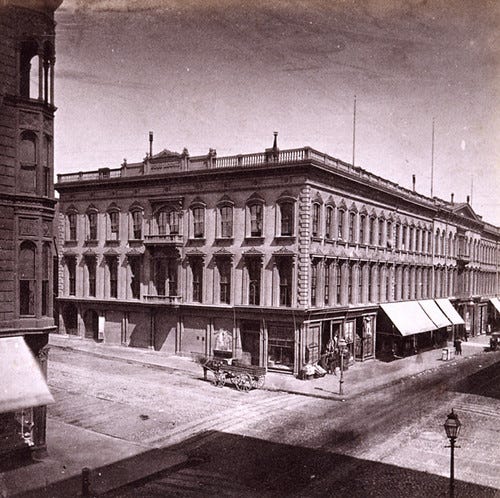Chapter 29 - Ted & Anna Judah and the Transcontinental Railroad
February, 1861—Sacramento, California: Ted and Anna Judah, Doc Strong.
With the election of Lincoln, Ted knew the hour had come. His dream of a Transcontinental Railroad would now surely become a reality.
The new President had been a railroad lawyer. Ted had not a single doubt he would support the railroad wholeheartedly.
Read After the Gold Rush from the beginning:
Ted had published his pamphlet Central Pacific Railroad to California just after the election, "directing attention to some newly discovered facts with reference to the route of the Pacific Railroad through the State of California."
Doc Strong had done his own part admirably. He’d helped coax $46,500 worth of stock pledges for the Central Pacific Railroad out of the citizens of Dutch Flat and the towns of Auburn, Illinoistown, Grass Valley, and Nevada City, who also stood to benefit from the proposed route.
California law stipulated that stock subscriptions of $1000 per mile must be in place before a railroad could be incorporated, which left Ted with $70,000 yet to raise.
Tracks of the Sacramento Valley Railroad, first railroad of the West
Now Ted went back to his recent employers, the Sacramento Valley Railroad, pitching his route for the Transcontinental Railroad—only to find that the Sacramento Valley board was very happy with their current monopoly on the steamship traffic and railroad distribution to the West, and had no desire to add the competition from the East that a railroad would bring. They muttered the old sentiments that a railroad through the towering Sierra Nevada mountain range was impossible, madness—and showed Ted the door.
But as Southern states rapidly renounced the Union, Ted saw the new Confederacy as more ammunition. For years, a Railroad Bill had gone nowhere because the divided Congress was unable to agree on a route.
Gathered around Doc’s pharmacy counter, Ted explained to Anna and Doc Strong, “The argument over a Northern or Southern route is now nil. The South has seceded—and ceded their place in the argument. It shall be the Northern Route. And with the country headed toward war, President Lincoln will be able to argue that a railroad is necessary for military purposes, and can use the war effort as an excuse to funnel funds into the railroad.”
Then at Anna’s gentle reminder, the three of them prayed for the Union and for the end of the scourge of slavery.
Russ House, Montgomery Street, San Francisco 1865
The next day, Ted and Anna departed for San Francisco, where they took rooms at the Russ House and Ted began soliciting San Francisco's bankers and shippers for the $70,000 still needed.
He assembled some top financiers for a dinner in a private meeting room in the hotel to make his pitch. The bankers listened, asked questions, expressed enthusiasm. And then the questions began.
“What happens if Congress does not pass a Railroad Bill? No road can be built.”
“If a bill is passed, the road cannot be completed for ten or twelve years.”
“What if the gold fields play out? What if the Comstock mines go bust?”
“What if the country goes to war?”
The final verdict fell like a death knell:
“Let us wait and see what happens to the Union.”
Anna read the news in Ted’s face as he stepped through their hotel room door. “Oh, my love,” she began. He closed the door and turned to her, his face a mask of resolute fury.
“Anna, remember what I say to you tonight, so you can tell me sometime. Not two years will go over the heads of these gentlemen I have left tonight, but that they would give all they hope to have from their present enterprises to have what they put away tonight. I shall never talk or labor any more with them. We are going back up to Sacramento on the boat tomorrow afternoon, to see what we can do with the citizens and loyal businessmen of that city.”
Anna kissed him, and went for the suitcase.
Read After the Gold Rush from the beginning:





